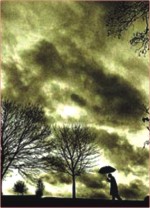Feature
“Casualty” A timeless poem
Tanvir Manzoor Hussain
 Although on the surface Seamus Heaney's “Casualty” appears to be a simple nostalgic commemoration of an acquaintance lost to an IRA bombing, the poem's message and implications stretch far deeper than that. As it progresses, “Casualty” paints an intensely vivid picture of the mordant realities of a political conflict and its repercussions on society, and turns in the end to a lamentation, a confession, and an expression of frustration, all at the same time. Although on the surface Seamus Heaney's “Casualty” appears to be a simple nostalgic commemoration of an acquaintance lost to an IRA bombing, the poem's message and implications stretch far deeper than that. As it progresses, “Casualty” paints an intensely vivid picture of the mordant realities of a political conflict and its repercussions on society, and turns in the end to a lamentation, a confession, and an expression of frustration, all at the same time. This shift in the direction of the poem parallels (and is perhaps reinforced by) a shift in the poet's attitude towards his subject, the acquaintance he elegizes. He is introduced as an ordinary and commonplace person, a fisherman by profession and a regular customer at the pub that the poet works in, A reticent and withdrawn individual, he “drinks by himself” and prefers to order drinks “without having to raise his voice”. His financial circumstances are a little more ambiguous since although he is “a dole-kept breadwinner” he is said to order drinks from “the high shelf” at the pub, indicating that either he was well off and was going through a lean fishing season, or that he wasted most of his money on drinking. He seems to be a man who is very much aware of his surroundings (“His fisherman's quick eye”), but chooses to remain indifferent to and unmoved by it.
Throughout these introductory lines what is striking is the detached quality of the voice it's almost as if the poet is trying to avoid explicitly expressing his contempt of the fisherman, and of how different their ways of life are. “Incomprehensible”, he says, “To him, my other life.” The poet would tactfully change the subject of their conversation to avoid talking about poetry when the two men were together, as he was “shy of condescension”, despite the fact that his very act of avoiding the topic of poetry demonstrates his condescending and despising attitude towards the fisherman, something that he would rue later in the poem.
But following the opening two stanzas, the voice changes abruptly, as does the flow of the verses, and in one fell line, he shocks us with the declaration: “He was blown to bits, Out drinking in a curfew”. It's a very apt way employed by the poet to get the true nature of such a pointless murder of an innocent through to the readers. The poet's altered feelings towards him becomes clearer as the poem now moves on to a description of the victims' funeral, where he views the burial procession (“the common funeral”) as a common death of the entire group of people present, not just those in the coffins, feeling himself ensnared along with them in the conflict “like brothers in a ring”. It was indeed a situation where people were being forced to fight their own brothers because of their religious and political differences.
His sentiments for the fisherman now become more pronounced as he imagines the last moments of the man's life: “Remorse fused with terror, In his still knowable face, His cornered outfaced stare, Blinding in the flash.” In a way, by imagining his efforts to stare down and defy death, he's now glorifying him, and implicitly praising his act of going out in a curfew by simply following his natural instincts. This is a crucial point made in the poem, that the innocent man is killed just because he followed his natural urge, and not because of any political or religious identity.
The image of the fisherman haunts the poet, and he hears him asking the poet for an explanation from the grave: “…Puzzle me, The right answer to that one”. In his inability to find an answer the poet realizes his own responsibility and guilt in the matter. “I missed his funeral” he says, and perhaps he did so purposefully, to avoid the “…quiet walkers, And sideways talkers”, the mechanistic people who “move in equal pace” and never speak out against the atrocities being committed. Therein lies society's fault, and he realizes that it's easy to avoid the tough questions and drift into an “indolent” state, assuming complacent silences and comfortable answers.
The poet rues his avoiding of conversation with the fisherman earlier in the poem, and ends the poem yearning to be interrogated by him again: “Dawn-sniffing revenant, Plodder through midnight rain, Question me again.” What is important however is that the question remains unanswered, or perhaps it is unanswerable but it's a critical question which the poet hopes will remain ever-present, just like the lingering haunting image of the fisherman in his mind, however disturbing it may be.
|
